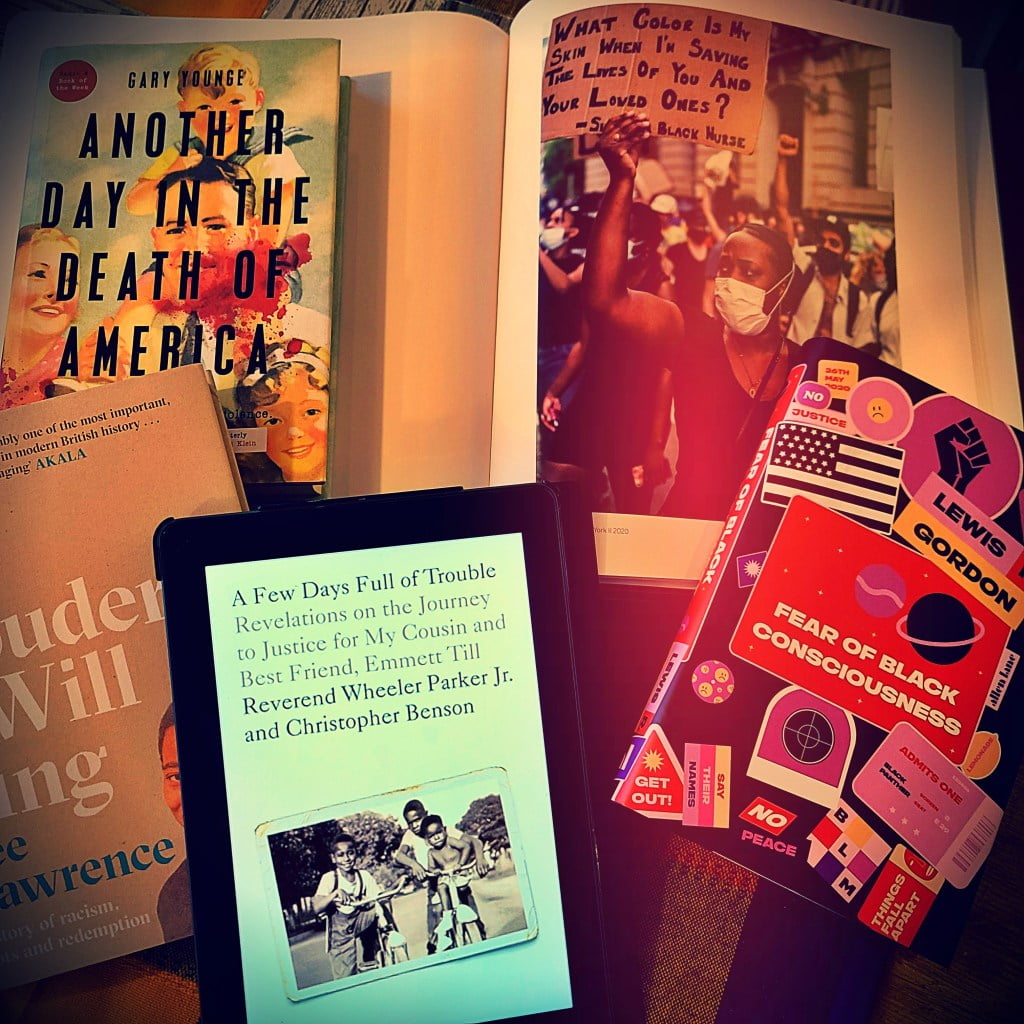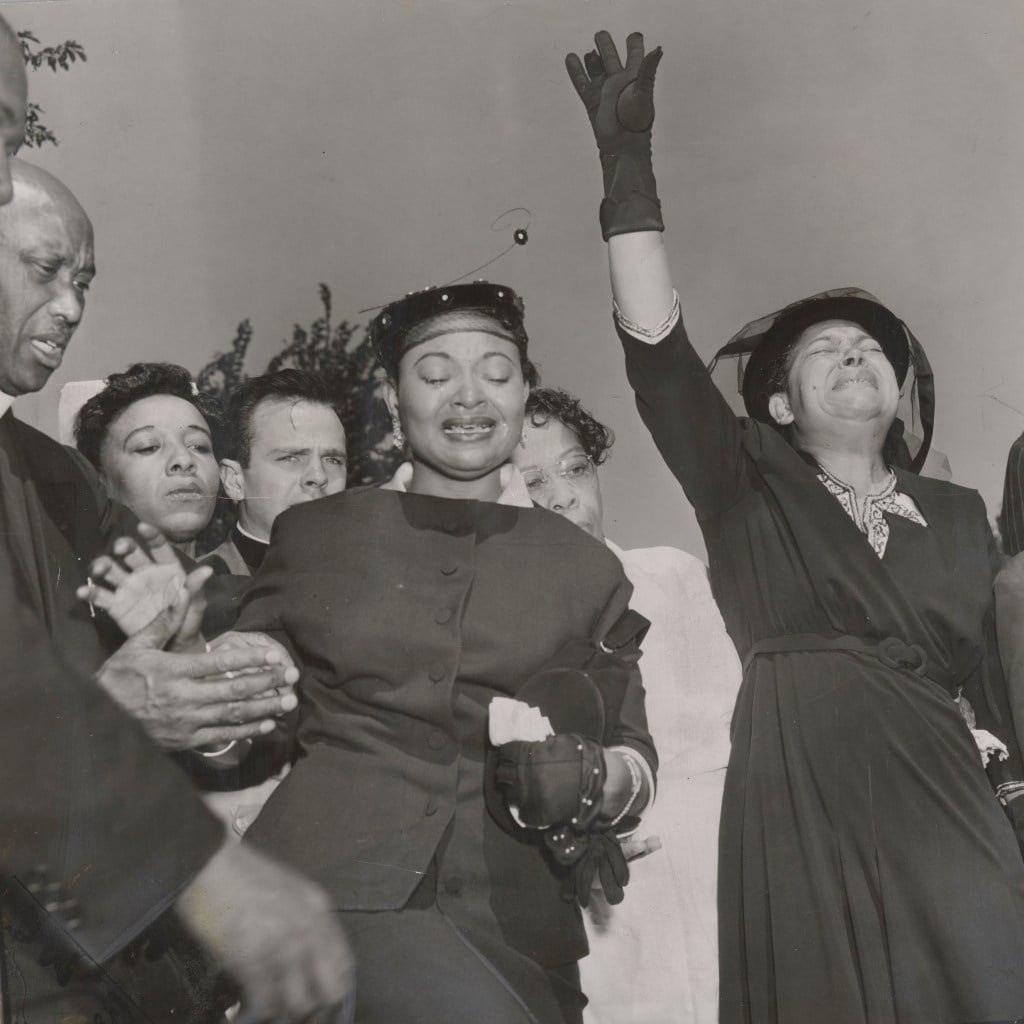
A Few Days Full of Trouble: Revelations on the Journey to Justice for My Cousin and Best Friend, Emmett Till is a powerful and disturbing book that tells the story of a young child’s racist murder and the subsequent 70-year fight for the truth. It follows the investigation that ensued, and the long journey for justice that continues to this day by the surviving witnesses who believe we need to preserve an accurate history of this figure.
The book is written by Reverend Wheeler Parker Jr., the last remaining person to have seen Till prior to his lynching in 1955. Parker’s account is both personal and historical. He shares his memories of his cousin as a boy, the night of the murder, and the years of activism that followed. He also provides insights into the recent investigation into Emmett’s murder, which was reopened in 2017. Alongside the reverend, Emmy Award–winning lawyer, journalist, and associate professor at Northwestern University’s Medill School of Journalism Christopher Benson takes part in trying to showcase the facts of this horrific event that has been continually misrepresented.
“Even if memorializing the truth in every way possible was the only thing we accomplished, it would be a big deal because of the way things had gotten so distorted over time.”
Reverend Wheeler Parker Jr, A Few Days Full of Trouble
The book was published in January 2023, only several months before the main accuser Carolyn Bryant Donham died at the age of 88. Her death marked the last chance for anyone to be held accountable for a kidnapping and brutal murder that shocked the world, hence the writing feels like a testament to what could have been and stands as an important document for years to come.

Who was Emmett Till?
Trigger warning: details of crime include torture and racial murder Emmett Louis Till was a 14-year-old African American boy who was brutally murdered in Mississippi in 1955. He was from Chicago and was visiting relatives in Money, Mississippi. It was alleged that he had offended a white woman, Carolyn Bryant, in her family's grocery store, which led to his abduction by Bryant's husband and his half-brother. Till was brutally beaten, mutilated, shot, and then his body was weighted with a 70-pound cotton gin fan tied around his neck with barbed wire before it was thrown into the Tallahatchie River. Till's body was recovered three days later, and his mother, Mamie Till, insisted on a public funeral service with an open casket to show the world the brutality of the killing. The murder trial of Roy Bryant and J.W. Milam garnered extensive national attention. Despite compelling evidence and the men's later admission to the crime in an interview with Look magazine, both were acquitted of Till's kidnapping and murder by an all-white, all-male jury. Till's murder and the subsequent trial were a significant catalyst for the Civil Rights Movement in the United States. Till's story remains an important reminder of racial violence and injustice.

Why is A Few Days Full of Trouble about misinformation?
Parker wrote that a big part of justice for Till would involve exposing the most significant lies—the ones proving responsibility for a crime—in an attempt to preserve an accurate record of the truth. He said: “Even if memorializing the truth in every way possible was the only thing we accomplished, it would be a big deal because of the way things had gotten so distorted over time.”
And fighting disinformation is a major aspect of Parker’s cause as he claims many of the reports were put out there by people like William Bradford Huie and Bryant, who seemed to be intentionally distorting the record for their own purposes. Huie was considered a prime suspect in the murder, while Bryant was the woman in question who made the allegation in the first place, reporting that the 14-year-old boy had acted ‘inappropriately’ with her, though this has never been proven.
The Jim Crow laws, a system of legal segregation and racial discrimination in the US that largely affected African Americans at the time, were in place from the end of the Reconstruction era in the late 19th century until the mid-20th century. These laws had a significant bearing on the case as Till was accused of whistling at Bryant, where any interracial interaction was forbidden. At the same time, an all-white jury acquitted the two white men accused of the murder, despite compelling evidence against them. Till's mother, Mamie Till-Mobley, eventually decided to have an open casket funeral for the world to see, which shocked the nation and the world. This public response challenged the status quo and played a part in the push towards the end of the Jim Crow era.
Read more: MLK Day: Books to celebrate Martin Luther King Jr
In A Few Days Full of Trouble, Parker believed that the suspect Huie was speaking to reporters in order to sell a story. For Bryant, it was about selling her image, the innocent bystander, targeted by Black men and objectified by White men – therefore reiterating the white woman victimhood stereotype. He added: “On the other side of the coin, the misinformation was put out there by people who were too willing to echo the disinformation, willing to accept some things without question: the reliability of a fellow journalist’s work, or the truth of a White woman’s allegations, or the belief that a Black kid did something wrong, with nothing more to hang it on than a White woman’s claim.”
“[The] misinformation was put out there by people who were too willing to echo the disinformation, willing to accept some things without question”
Reverend Wheeler Parker Jr, A Few Days Full of Trouble
As a result, the reverend spent some time trying to identify a woman in the truck, a key element in the case, while reporters seemed to want to spend their time trying to identify a girl in a photograph. It was reported that Rob Bryant, the woman’s husband, ordered an African American man J. W. Washington to seize the boy, put him in the back of a pickup truck, and took him to be identified by a companion of his wife who had witnessed the episode with Till.
What Till’s cousin believes is that even assuming that both stories are real, “only one of them definitely is worth our time”. After all, only one was responsible for the death of Emmett Till. The only one we need to identify and hold to account.
Why Parker still fights for Emmett Till
Parker endearingly called Till Bobo throughout his short life, as well as through the book itself. For the author, who was only 16 at the time of the death, the deep trauma vividly bleeds through the pages. It is clear to see his survivor’s guilt of not being able to help at the time, as well as the need for closure to this grotesque issue. The writer says that “white people want to move on. It’s a privilege, I guess, to be able to do that. Just move on. Bygones. Water under the bridge. All that. Not so easy to do when you’ve been a victim of racial violence or racial injustice.”
“For me it had all been about Bobo and Simmie and Mamie. I was the last person left who could represent their suffering in what the government had described as a “horrific” tragedy”
Reverend Wheeler Parker Jr, A Few Days Full of Trouble
At the same time, he says that Bobo’s death serves as a reminder that this is not over, and that by attempting to erase his memory, it serves as a way to create a “guilt-free path”. But Parker, now 83-years-old, says that “reckoning with our past is the important first step in reconciling for the future.”
His journey for the truth was not straightforward in the least. For one, Parker believes they’ve lived with a double blow – the murder itself and then the way Till was characterised in the courtroom and by some in the press. Bryant’s own book led to many questions being raised regarding the authenticity of her story. In his quest for accountability Parker participated in the 2004 FBI investigation of Till’s murder and the 2017 reopening, and along with the late activist Alvin Sykes, was involved in the development of congressional legislation that established a cold case unit at the Department of Justice that allows the DoJ to reopen unsolved Civil Rights era murders.
Read more: Juneteenth books: 6 powerful reads on emancipation
In a statement during the FBI investigation, it was said: “By closing this matter without prosecution, the government does not take the position that Carolyn Bryant’s state court testimony was truthful or accurate. There remains considerable doubt as to the truthfulness of Carolyn Bryant’s 1955 state court testimony, which is contradicted not only by your account of events but by the state court testimony of others who were with you and Mr. Till that day.”
This legislation was eventually named the Emmett Till Unsolved Civil Rights Crime Act. It was signed into law by former President George W. Bush and reauthorised in perpetuity by his successor Barack Obama. In March of this year, President Joe Biden signed into law the Emmett Till anti-lynching law after 100 years of congress attempting to make lynching a crime. He participated in drafting the bill that was passed by the Senate and the house In December 2022, that awards the Congressional Gold Medal posthumously to Emmett Till and Mamie Till Mobley. As a result, the author will also be presented with the award for his decades of activism.
But at the end of all of it, Parker realised that despite the case being so deeply personal and painful to him, it was also now part of American history. He said: “For me it had all been about Bobo and Simmie and Mamie. I was the last person left who could represent their suffering in what the government had described as a “horrific” tragedy.”
Key takeaways from A Few Days Full of Trouble:
One of the strengths of the book is Parker’s honesty. He does not shy away from discussing the difficult and painful aspects of the murder. He also writes openly about his own anger and frustration with the lack of justice for his cousin.
Another key aspect of the book is Parker’s message of hope. Despite the horror of Till’s lynching, Parker never gives up hope for justice. He believes that Till’s death helped to ignite the Civil Rights Movement and that his legacy will continue to inspire activists and advocates for racial justice.
Overall, A Few Days Full of Trouble is a powerful and important book that tells a story that needs to be heard. It is a must-read for anyone who wants to understand the history of racial violence in the United States and the ongoing fight for justice. The Emmett Till case may now be closed but the story continues and will live on forever.
If you liked this…
In the meantime, check out the episode with Fear of Black Consciousness author Professor Lewis R. Gordon.
[…] 📚 A Few Days of Trouble by Reverend Wheeler Parker, Jr and Christopher Benson. The last surviving witness to the lynching of Emmett Till tells his story, with poignant recollections of Emmett as a boy. Read the review on A Few Days of Trouble. […]
[…] Read: A Few Days Full of Trouble: truth about Emmett Till murder will set us free – review […]
[…] Read: A Few Days Full of Trouble: truth about Emmett Till murder will set us free – review […]